Concept/Project Description
This is an experimental Dance-Theater performance story in the telling; Addressing the negative human effect on water bodies and the environment which are contributing to harsh climate change, water pollution and its dangers and measures to prevent these. The Project is a participation of GLOBAL WATER DANCE in Ghana Titled, “TSITO” - which simply translates in English as Water Rock or Water Bank which also happens to be the very name of the town representing Ghana as the project's Location site. Tsito Township is located in the southern part of the country. Its settlers are known as the ɛvɛdome people of Volta region and the language spoken is same as ɛvɛdome. This part of the country happens to be one of Ghana's beautiful geographical areas made up of many water bodies such as streams and lakes as well as gigantic rock formations and large areas of green vegetation. Tsito's main water bodies get their source from rocks scattered deep in the Tsito forest. These waters which trickle down towards gravity have created a number of streams and tributaries that go all the way to neighboring communities. These water bodies also serve as a source of natural water for the Volta Regional branch of the Ghana Water Company limited for treatment and distribution. These natural attractions and beautiful landscapes put Tsito Township in a better position in representing the Nation Ghana. Choosing and titling the project by this place, is with a calculated intent to better project the Global Water Dance initiative concept which is basically on environmental activism with regards to protecting and preservation of the natural habitat and waters. Unfortunately, the Tsito town is losing its green vegetation at an alarming rate. Forests lands around streams and lakes in the Tsito enclave are owned by families. Due to greed and economic challenges, some of these families and their elders are selling their portions to private developers who end up falling the trees around the water bank for businesses. These developers have no reforestation policies hence the lands are left bare after falling the trees. Another alarming activity endangering the marine lives and the communities along our water bodies is illegal sand winning on the banks of the rivers and the shores of the seas. This activity affects the turbidity of the water bodies, leaves gorges on the banks and creates flat shores which allows the sea to take over villages and territories along the beaches. A typical example- in some parts of the country located by the Sea like most parts of the beaches along the Anlo and Keta stretch, the Sea has claimed a large part of the territory and villages along its shores, rendering the local folks homeless. Part of this was as a result of consistent sand winning at the shores which went unchecked over a long period of time. Probably some of the chiefs and leaders were involved hence the audacity of its continuation by the perpetrators. In the light of these and many other environmental degrading activities, we at ZAAFI BLACK ARTS AND HOME (ZAAFI ARTS) in partnership with DANCERS WITHOUT BORDERS ORGANIZATION in Germany and some renowned local organizations, media houses, individuals as well as the Chief and traditional council of Tsito (who happens to be an environmental activist himself) have put up this Dance-Theater performance towards the GLOBAL WATER DANCE FESTIVAL which is themed WATER and CLIMATE CHANGE and the sole aim is to sensitize all and sundry on the effects of their negative environmental activities. Collaborating to perform with Street Dancers, Folk Dancers and Musicians and also holding workshops in the community schools (basic to senior high level) and traditional durbar centers in the presence of the local people and the Chiefs and Elders as we give awareness through entertainment on the dangers of water pollution and destructive not only to water life, but also the environment and human life.
Activity Breakdown
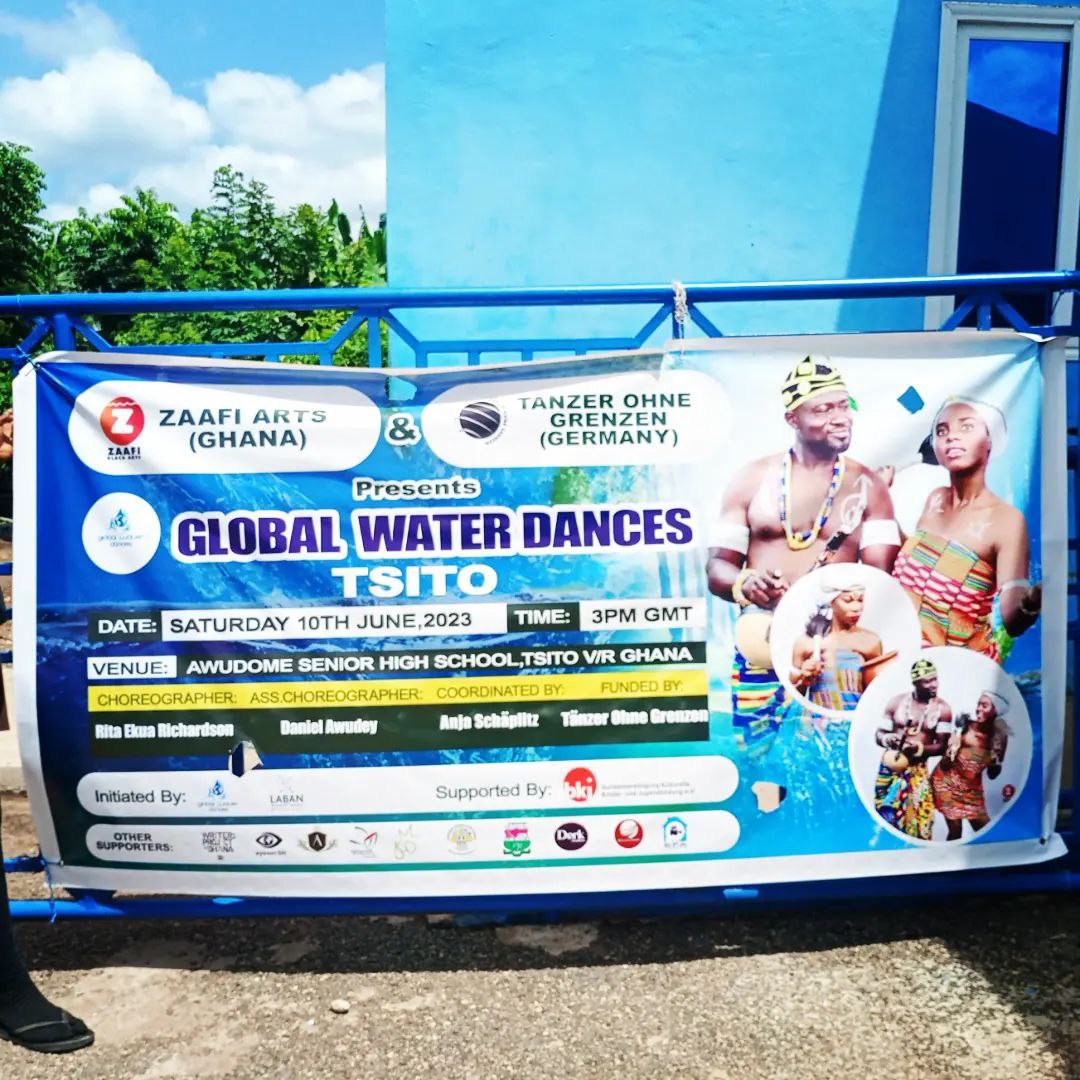 We started from the month of April and organized outreach programs and workshops in community centers and schools on environmental degradation related topics. Safeguarding the ecosystem, with much emphasis on our water bodies.
And we were privileged to have our coordinator Anja schäplitz all the way from Germany in this early part of activities where together we facilitated in some of the workshops. Then came the week of presentation which was also the World Ocean celebration - specifically 8 June, thus series of activities as follows;
We started from the month of April and organized outreach programs and workshops in community centers and schools on environmental degradation related topics. Safeguarding the ecosystem, with much emphasis on our water bodies.
And we were privileged to have our coordinator Anja schäplitz all the way from Germany in this early part of activities where together we facilitated in some of the workshops. Then came the week of presentation which was also the World Ocean celebration - specifically 8 June, thus series of activities as follows;
- A clean up exercise at the community while announcing the main event. This was done alongside ‘Jama’ songs. A ‘Jama’ song is basically a local parlance version of cheerleading song interlaced with drumming, dancing and chanting. The idea was to create a musically charged atmosphere thus attracting the community people to participate.
- Tree planting exercise. The team after the cleanup exercise marched to selected areas of the town that had trees felled to plant new trees.
- Finally the main event day which had the Global Water Dances performance show in a form of traditional durbar with the gathering of the chiefs and people of the community, local government officials and parliamentarians for the area, media representatives and other dignitaries including young adults. And unlike planned initially, the performance show was done in two parts mainly as a result of the weather condition on that day which had rain pouring throughout the day hence we decided to use it to our advantage by having a first " In Water presentation" we call it. Therefore we stepped into the rain and did our performance and achieved an actual supposed to be Water dance. This was followed by the main presentation that had to take place indoors in a school auditorium hall because of the unsettled weather situation. This second show started with traditional dance performances from the local folk group then, followed by the senior high students dance representatives. Then the final enactment for the day; the Global Water dances performance story which was presented in a form of Dance-Drama. And we ended the show with the Global Water Dances participatory ritual dance movement with the audiences. Main performers' ages range from 6 to 50 years and a total of 60. This includes street dancers, primary basic level to senior high students, and the local folk dance.
Costumes
Costumes based on our story-line was a mix bag of modern day casual attire, dresses made from black polythene/plastic bags and rags to represent the pollution situation in the water bodies. Then the main costume was made from Ghanaian traditional print materials and beads with special environmental symbols to project the identity of the community the performance was taking place in.
Props
These included:- Traditional silver basins, plastic bags, and bowls, empty water sachets, calabash, basins, food chest, traditional brooms, sticks
Music Instruments
Mainly traditional Drums, flutes, music bells.
Story-line/Synopsis
Our fictional story is based on four Demi-god sisters of ‘Tsito’. They are very popular for using their demi-god prowess to serve the people’s spiritual needs. Then came a time when everything began to go wrong. A pandemic broke loose and begun to spread like the word of God so that people were dying like house flies. The Demi-gods showed no empathy to the plight of the people. The people felt hurt and betrayed. The demi-god sisters strike anyone who consults them with more illnesses and deaths. The people got even more afraid, confused and terrified and were powerless to confront these powerful sisters. They consulted the chief priest of the town to meditate on their behalf to find out why the demi-god sisters have turned their back on them? Why have they turned from gracious saviors to malicious destroyers? But the chief priest who has managed to hide his fears from the people with regards to the pending predicaments decides to consult a higher mediator. A mediator who is as old as the foundation of the village and as graceful as the fresh water fountain which is the source of the river. Someone who dwells amongst them but unknown to their naked greedy eyes. She is Asaase-Nyimgba, Mother Earth. And she is the mother of the demi-god sisters. Would the chief priest succeed on his mission in finding the root cause of the plight of the people? Your guess is as good as mine.
Character in presentation
The Three sister Goddesses in character represent three main water bodies in Ghana.
- River Pra / Wuve
- Lake Bosumtwi / Tsawe
- River Ofin / The ocean / fall The higher priestess is Asaase Nyimgba - {mother earth} The said destruction by the sisters simply is the poor state that the water has gotten due to the negative activities and pollution from the people which ends up destroying them.
Staging
Outdoor in the rain pour and as well as indoor in the AWUSCO school hall. Date: 10th of June 2023.
Motivation
Our world is enduring severe climate conditions created by humanity’s greed and unperturbed negative activity on the environment. Deforestation, environmental pollution, pouring of chemicals and dumping of waste materials in our water bodies and river banks are but a few of the activities destroying the water bodies and the environment. Worse of these activities is the illegal gold mining ongoing in some rivers in the country. Notable areas are the Western and Western North regions and the Ashanti regions of Ghana. The application of mercury and other chemicals by these miners have polluted the water so much that the formerly fresh blue and colorless water surface have all turned to brown and muddy. Marine lives (Fish and other crustaceans) are being destroyed and poisoned. Unfortunately these poisoned fishes ends-up in the belly of the masses who buy them from local fisher folks living alongside these water bodies. Water is the currency of life. These activities have gotten to an alarming state and cannot be allowed to continue hence we and our partners are inviting all and sundry to join the clarion call to sensitize, educate and inform the general public on the menace these activities are doing to our society. Tsito is a good course. Let us all support the human body and the planet need clean water to maintain health and a clean environment. If the very element that is needed for a healthy planet is destroyed, then our planet and our world will be doomed.
Acknowledgments/Credits
Local partners and supporters
- Togbe Gobo Dake XII - Chief / Dufia of Awudome, Tsito
- Tsito Secondary Technical School .
- Tsito Cultural Dance Troupe .
- Awudome Senior High School Tsito.
- Exclusive Events.
- Citizens Association of Tsito.
- Tsito Dunenyoza Easter Planning Committee.
- Writers Project of Ghana.
Media partners
- WRITERS Project @Citi radio show - Citi FM 97.3 , Accra Ghana.
- Amen Amuzu-Prisamen Photography
- Ivy Setordzi -Joynews
- Mr. Kafui Gati -Daily Graphic
- Fkul Godson -EFA House Productions.
- Derrick Asante - Derks Studios
Other external supporters
- Rosie Varela - USA
- Maelyn ( Narah Pracem ) USA
- Andrews Evans - UK
- Derrick Asirifi Nyarko
- Joachim Dambo
- Mr. Isaac Nketiah
- Mr. Edward Asamanih
- Selorm Attadze I
- Bundesvereinigung kultureller Kinder - und Jugendbildung e.v. (bkj). Germany
- Anja schäplitz - Germany
- Vannia Ibarguen ( GWD artistic Director) USA.
- Natasha Ahaldeff- Jones ( GWD educational project head) USA
Producers
This Theater for development project is one amongst 21 international projects that is funded by Tänzer ohne Grenzen. And coordinated by Anja Schäplitz of ( TOG/ DWB - Germany) - In close connection with Global Water Dance, the organization that initiates GWD www.globalwaterdances.org.
Site leader and Choreographer: Rita Ekua Richardson of Zaafiarts Production.
Assistant Choreographer: Daniel Awudey
Project Coordinator: Anja Schäplitz of Dancers without Borders - Germany.
GWD2023 Tsito Rain Performance
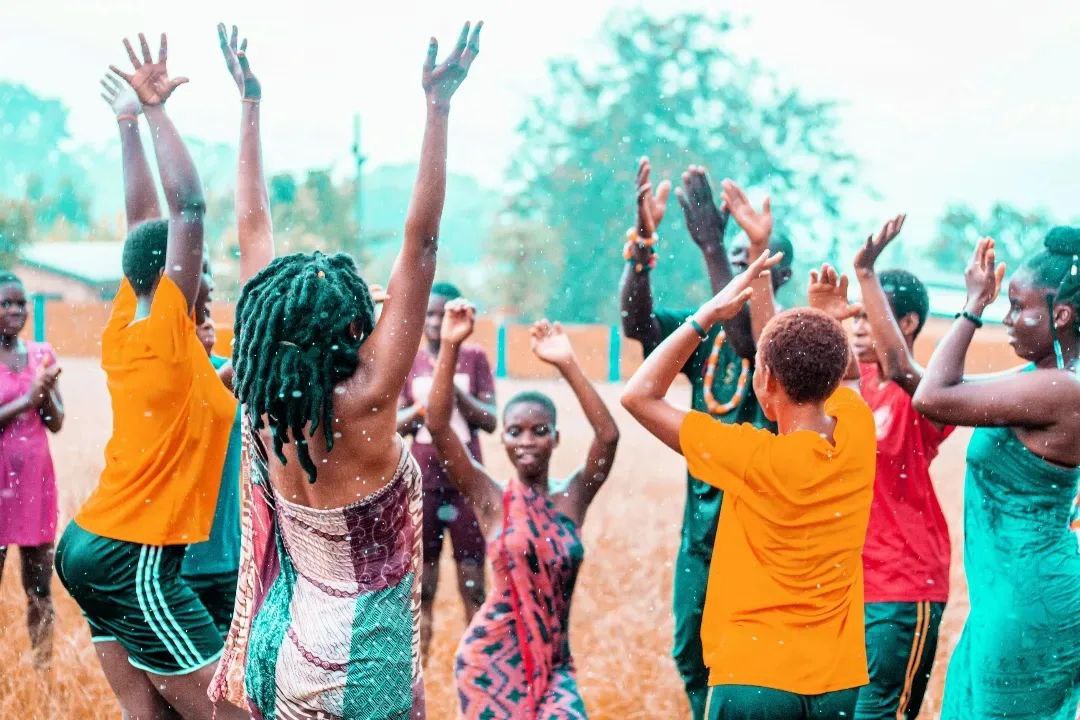 On our D-Day the 10th of June 23, right after our second Tree planting session 😀 then came the Rains to wash us off our dirt's seemingly.
Seeing it as a sign of Mama Earth's accepting and recognizing our efforts; We stepped into the Rain pour with a first performance in "Water Dancing" joyously in gratitude.
Yes, We pledged to change positively in the course to saving our planet
To Protect the environment plus
Preserve our Waters.
To practice afforestation
And we Delivered ... Are Delivering!
#Global Water Dances - This is Our Participatory arts To environmental activism!
On our D-Day the 10th of June 23, right after our second Tree planting session 😀 then came the Rains to wash us off our dirt's seemingly.
Seeing it as a sign of Mama Earth's accepting and recognizing our efforts; We stepped into the Rain pour with a first performance in "Water Dancing" joyously in gratitude.
Yes, We pledged to change positively in the course to saving our planet
To Protect the environment plus
Preserve our Waters.
To practice afforestation
And we Delivered ... Are Delivering!
#Global Water Dances - This is Our Participatory arts To environmental activism!
Our GWD in Tsito School outreach 1
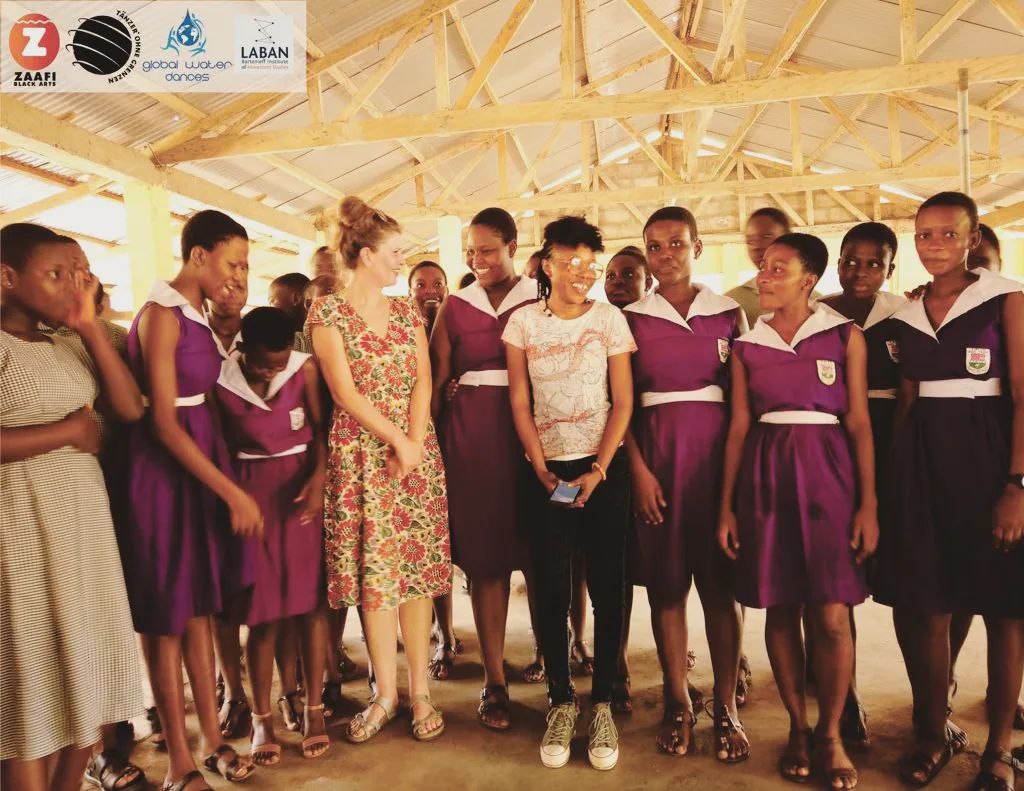 Introducing our GWD'S project in schools.
Set off with @anja_schaeplitz this April 2nd - Tsito secondary Technical school.
And this ecological arts/participatory arts experiences with the Children/young adults been worth it. Much appreciation to the schools authorities for their acceptance and collaboration. And to my co- host/ facilitator Anja Schaplitz.
Introducing our GWD'S project in schools.
Set off with @anja_schaeplitz this April 2nd - Tsito secondary Technical school.
And this ecological arts/participatory arts experiences with the Children/young adults been worth it. Much appreciation to the schools authorities for their acceptance and collaboration. And to my co- host/ facilitator Anja Schaplitz.
Meeting the Tsito People
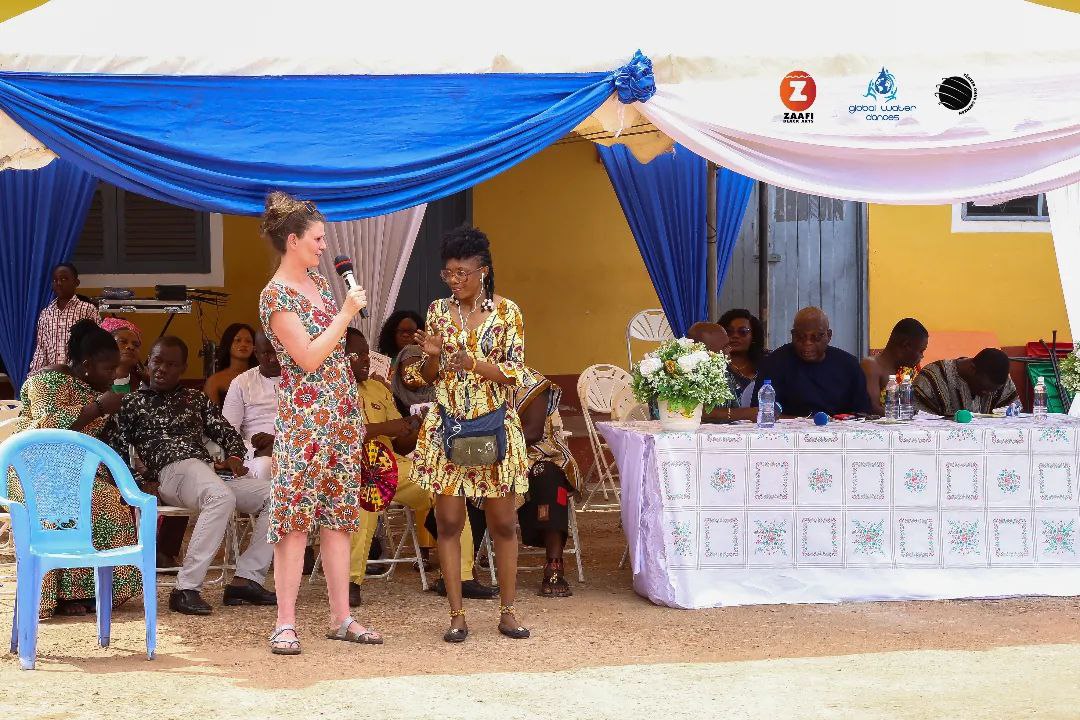 Still on our Tsito GWD'S April dairies: Anja Schaplitz and I had the opportunity to meet with Chief Togbe Gobo Dake XII- Dufia ( Ruler/King) of Awudome Tsito who invited us to their Easter "Dunenyo Za" festival celebration's grand durbar.
The festival "Dunenyo Za" (which simply translate Town/Community wellbeing festival) and as the name suggests, is aimed at bringing the people together in the mindfulness of building and progress, individually and collectively in protecting their environment and infrastructure development. The festival coincided with our Theatre for development project Global Water Dances mission. Hence, the Dufia’s (Chief) invitation to have us join in the celebration and also to take the opportunity have us officially introduced to the people and encouraged them to embrace our mission and project.
Still on our Tsito GWD'S April dairies: Anja Schaplitz and I had the opportunity to meet with Chief Togbe Gobo Dake XII- Dufia ( Ruler/King) of Awudome Tsito who invited us to their Easter "Dunenyo Za" festival celebration's grand durbar.
The festival "Dunenyo Za" (which simply translate Town/Community wellbeing festival) and as the name suggests, is aimed at bringing the people together in the mindfulness of building and progress, individually and collectively in protecting their environment and infrastructure development. The festival coincided with our Theatre for development project Global Water Dances mission. Hence, the Dufia’s (Chief) invitation to have us join in the celebration and also to take the opportunity have us officially introduced to the people and encouraged them to embrace our mission and project.
School Outreach in AWUSCO
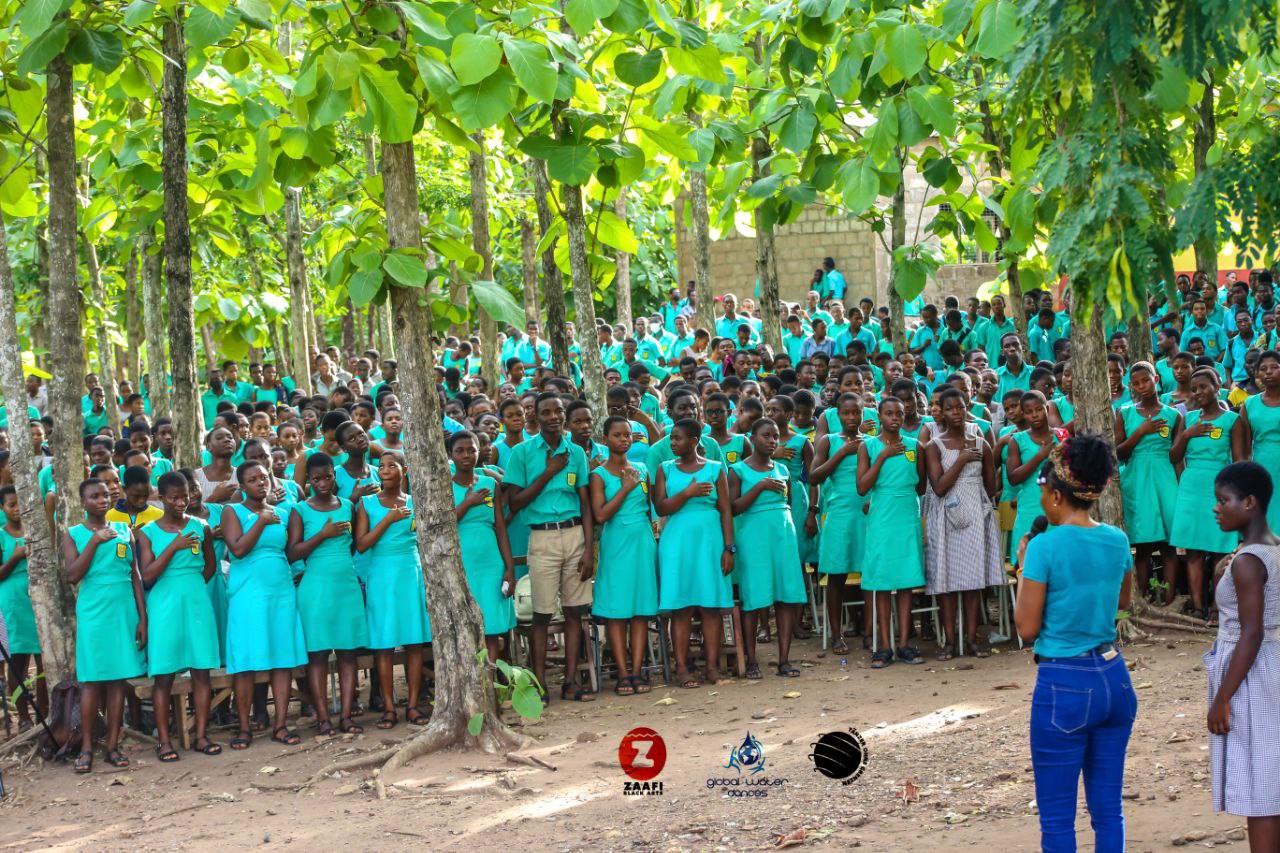 #GWD2023 in Tsito School Outreach project #MayDairies...
And this time was AWUDOME SENIOR HIGH SCHOOL, Tsito- Ho west Volta region Ghana.
And once again our environmental activism agenda with these about 2000 young future leaders has been nothing less than an overwhelming impactful and insightful experience.
#GWD2023 in Tsito School Outreach project #MayDairies...
And this time was AWUDOME SENIOR HIGH SCHOOL, Tsito- Ho west Volta region Ghana.
And once again our environmental activism agenda with these about 2000 young future leaders has been nothing less than an overwhelming impactful and insightful experience.
Grateful to the school authorities for their acceptance and collaboration. And of course to you hardworking film crew you guys made a great team this past Wednesday the 17th May 2023.
